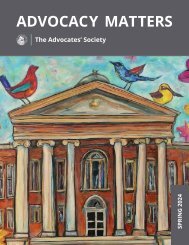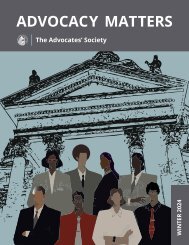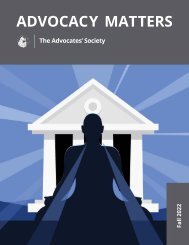Keeping Tabs - Winter 2022
Stay up-to-date on news and events from our Young Advocates' Standing Committee (YASC) with Keeping Tabs.
Stay up-to-date on news and events from our Young Advocates' Standing Committee (YASC) with Keeping Tabs.
You also want an ePaper? Increase the reach of your titles
YUMPU automatically turns print PDFs into web optimized ePapers that Google loves.
Q. What is your greatest<br />
extravagance in your everyday<br />
life?<br />
A. Japanese knives, skincare,<br />
and oat milk in my<br />
coffee.<br />
Q. What is your favourite part about the practice?<br />
A. My favourite part about the practice, especially litigation,<br />
is being exposed to so many different forms of knowledge.<br />
Depending on the week, I could be working on a range of files<br />
involving mental health, geology, or cannabis. It is a great privilege<br />
to show up to work every day to learn something new<br />
about the world as well as the practice.<br />
Q. You recently represented TAS in the Anderson v Alberta appeal. Why was it important to<br />
you to get involved in this case?<br />
A. When I heard that a senior partner in our firm would be representing The Advocates’ Society in this<br />
appeal, I jumped at the opportunity to get involved. The Anderson v Alberta appeal was exciting to me as I<br />
was familiar with the underlying litigation and knew that this appeal would present a unique opportunity<br />
for the SCC to address its inherent jurisdiction to award advance costs and in turn promote access to justice.<br />
The decision will be significant for Indigenous communities pursuing section 35 litigation and raises<br />
questions (that I think those of us in the legal profession ought to consider) as to how our legal system<br />
can and should be used to promote reconciliation. The implications of this appeal will also be significant<br />
for all litigants bringing cases of public importance before the Court. Intervening in a matter to promote<br />
access to justice allowed me to uphold my duties as a lawyer and make an exciting first appearance at<br />
the SCC. I hope my practice will continue to be shaped by cases like this appeal.<br />
Q. What are some things that you learned about access to justice as a result of your<br />
involvement in that intervention?<br />
A. While I have always been interested in how lawyers can enhance access to justice, working on<br />
this appeal allowed me to better understand some of the substantive jurisprudence on access to<br />
justice. In Trial Lawyers Association of British Columbia v. British Columbia (Attorney General), 2014 SCC<br />
59, the SCC affirmed that there should be “some degree” of constitutional protection for access to<br />
justice, but exactly how that protection might look appears to be evolving with the context of each<br />
case where the principle arises.<br />
In the Anderson appeal, we used our role as intervener to encourage the SCC to consider (and perhaps<br />
emphasize) the constitutional dimensions of access to justice as they clarify the advance costs<br />
framework.<br />
17


















